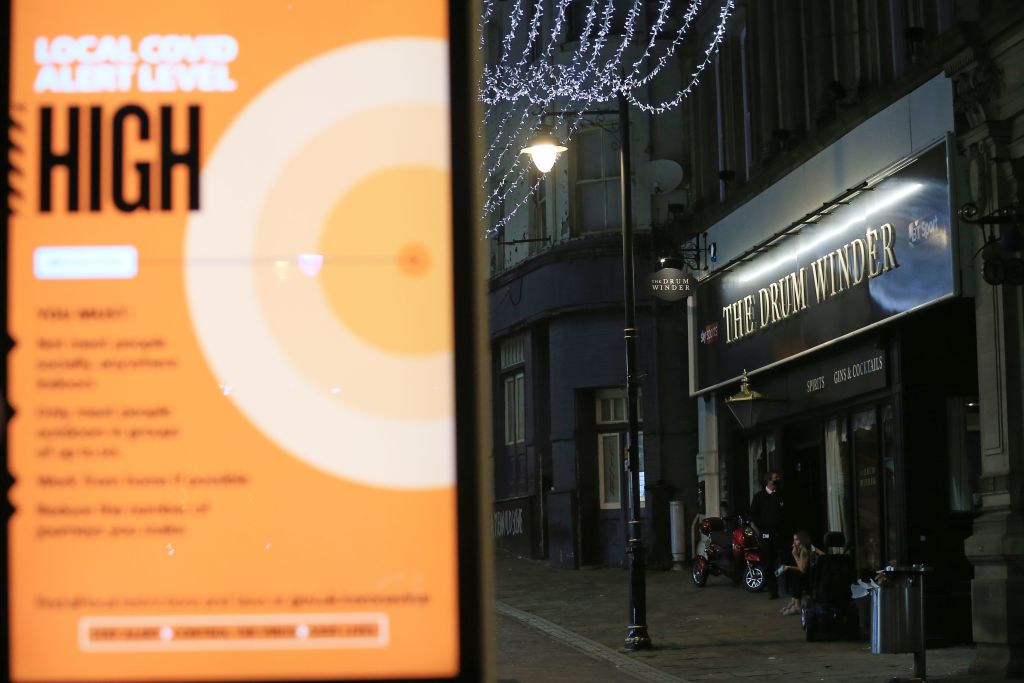Maybe it had to come: a note on my local (London) message-board said that the two Marks & Spencer food halls where I have taken to shopping since the first pandemic lockdown are now offering – toot the bugle, as the Prime Minister might say – a booking system. Of course, this is presented as a big improvement, ‘part of our efforts to make shopping easier for our customers,’ according to M&S. It’s called ‘express access’, the idea being that, following the introduction of Lockdown II, you will be able to ‘book a slot’ to avoid queuing.
True, the system is voluntary. But how long will it be before those of us improvident enough to think that we can just, well, turn up and buy some lunch, find ourselves directed to the end of a well-marshalled queue – not just any queue, no doubt, but a Marks & Spencer queue – while better-organised shoppers roll up, apps at the ready, to be ushered past?
And so goes yet another little space, another little freedom. For if there is one loss that this pandemic has inflicted – beyond the devastating loss of life, impaired health and banned social contact – it is spontaneity. In almost every area of life, it has become harder and harder just to seize the moment, to do something on a whim.
When the general reopening began after Lockdown I, this was the difference between before and after. Before, you could bump into a friend and decide just like that to go for a coffee or a drink. After, you had to agree in advance and, increasingly, book. Before, if you were fortunate enough to live or work near a gallery or museum with free admission (as most now are), you could wander in if you felt like it or suddenly had space in your day, even for half an hour or so. After, you had to book.
Before, one of the big advantages of cinemas over most theatres and concerts was that you could turn up on spec. If the showing you were interested in was full, well tough, but it was worth a punt. You could go off and do something else instead (like go to stock up at M&S). In the brief interval when some cinemas reopened before Lockdown II, you couldn’t do that. You had to book and turn up with your online ticket. The same with gyms and pools. Before, you just showed up with your kit; after, you needed a time slot and a ticket – and doubtless will again, if and when we return to Tier 2 and they can afford to reopen.
Fancy going out to eat? Under Lockdown II, that’s not allowed, unless by eating out you mean tackling fish & chips on the pavement in the dark. But there was a time, long ago, when you could just nip out for a meal if you felt like it; after Lockdown I and under the tier system, you have to book. The same with haircuts, manicures and the rest. Before, you could choose whether to reserve in advance, but you didn’t have to.
You could even, as I admit to doing in what now seems that brief blissful interval of summer freedom, indulge in some last-minute travel. The even more last-minute closures of quarantine ‘corridors’ (thank you, Grant Shapps) soon put paid to that, but it was exhilarating in a way while it lasted. To walk around Venice and Berlin shorn of mass tourism were privileged, if guilty, pleasures, as indeed were the sights and silence of a deserted London in the first weeks of Lockdown I.
Now, I appreciate that not everyone can be so footloose and fancy-free. Work, school, and other obligations all require an amount of planning and, in a good way, lend structure to a day, month or year. And some people have to plan more than others even without the special conditions of a pandemic. There was a time for me when travelling, or just going out, with my husband, who had Parkinson’s, needed to be planned like a military exercise.
One consequence, though was that spontaneity became even more precious. An unexpectedly warm weekend day, and you could set off for a walk or a drive on the spur of the moment; stop at a village pub, drop in on friends. You could take a detour, enjoy chance meetings, stay on after a play or a concert for a drink. Some of the most memorable experiences come about by pure chance, yet the rules we now live under make such random pleasures ever fewer and further between. You might even find yourself turned back (or worse) for straying the wrong side of the Welsh border.
For some reason, Lockdown II, while in many ways less restrictive than its predecessor – more shops and takeaways open, more people around – has come with new and ‘improved’ organisation. This has now reached the point that, when I approach the park entrance for my ‘permitted exercise’, I half-expect to find instant fences (in the manner of student accommodation at Manchester university) and guards with stop-watches demanding to check my ID. A constraint on liberty too far? Of course. But so, once upon a time, would have been the very notion of booking a time slot to shop at M&S.






Comments